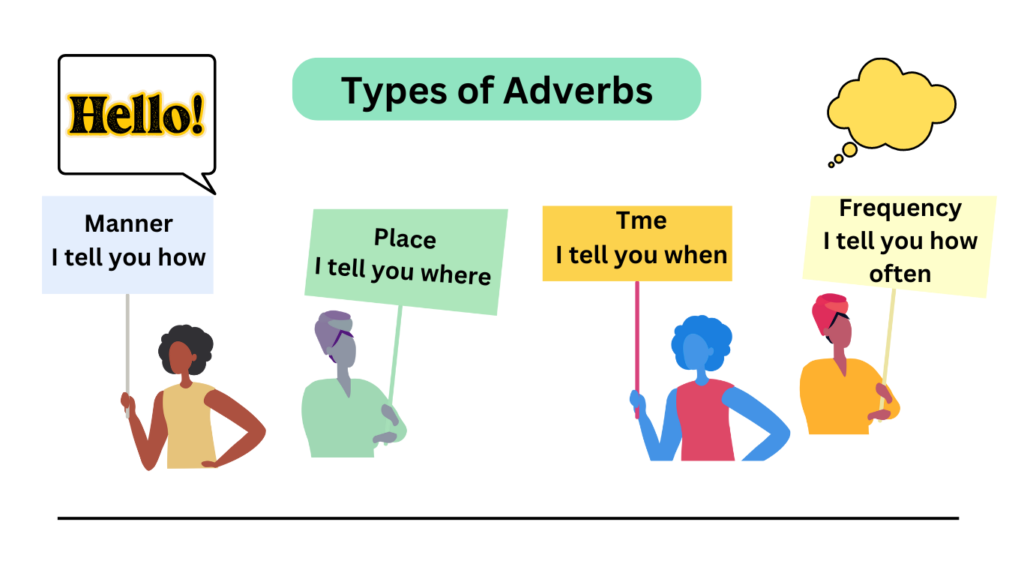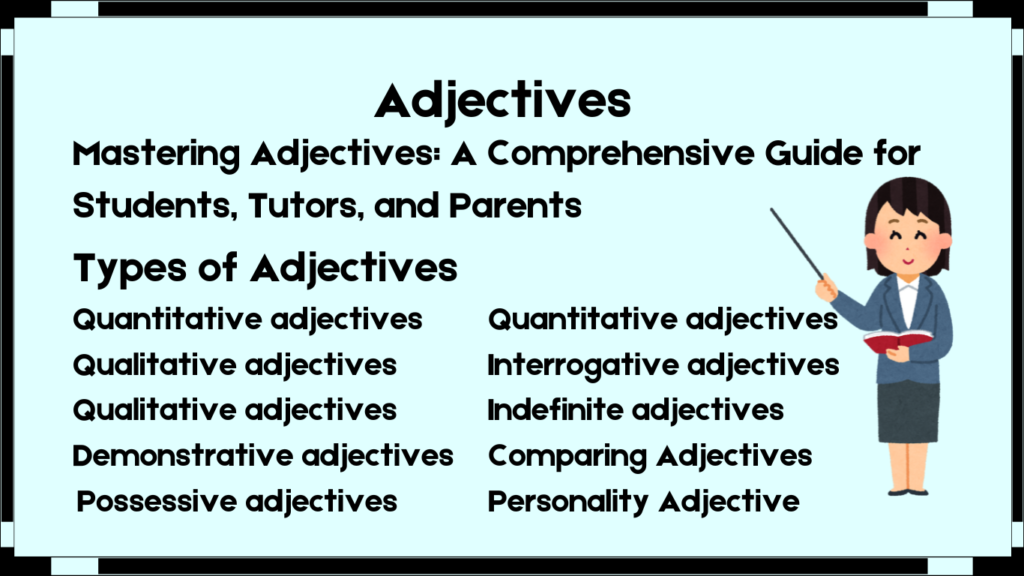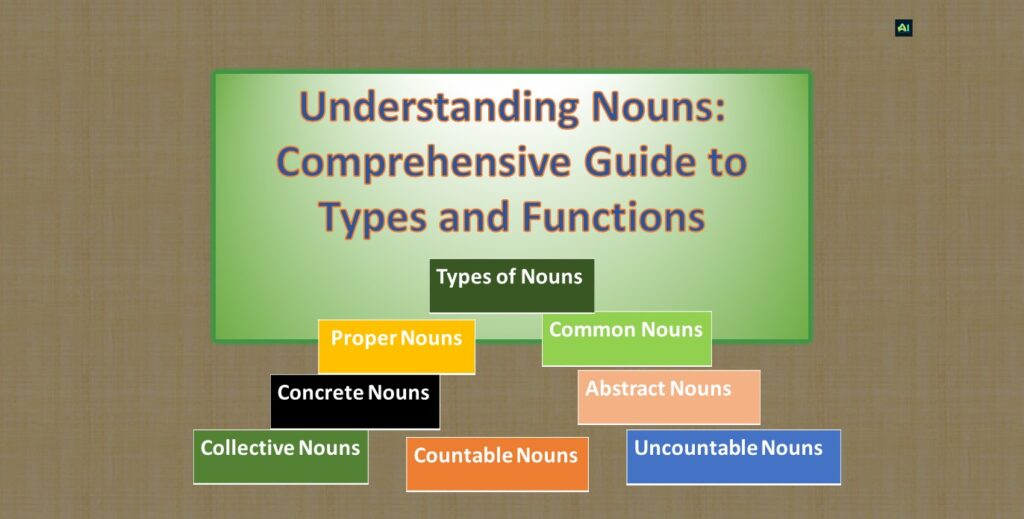Understanding Adverbs, their types, Functions, and Usage is crucial for effective communication. Imagine not being able to describe how, when, or where something happened! Adverbs help clarify and modify verbs, adjectives, and other adverbs, adding depth and nuance to our speech and writing. In this post, we’ll examine the various types of adverbs, exploring their definitions, functions, examples, and usage.
Types of Adverb
1. Adverbs of Manner: An adverb of manner describe how something is done.
Examples:
– She sings beautifully. (beautifully modifies the verb sings, describing the manner of singing)
– He drives carefully. ( carefully describes the manner of driving)
– They work diligently. (diligently describes the manner of working)
2. Adverbs of Time: An adverb of time Indicate when something occurs
Examples:
– They arrived yesterday. (yesterday modifies arrived, indicating the time of arrival)
– We’ll meet tomorrow. (tomorrow indicates the time of meeting)
– The concert starts at 8 PM. (indicates the time of the concert)
3. Adverbs of Place: An adverb of place specifies where something happens
Examples:
– The conference is held upstairs. (upstairs modifies the verb held, specifying the location of the conference)
– The park is nearby. (nearby specifies the location of the park)
– The company is located downtown. (downtown specifies the location of the company)
4. Adverbs of Frequency: An adverb of frequency tells how often something occurs
Examples:
– I exercise regularly. ( regularly modifies exercise, describing the frequency of exercise)
– They visit us rarely. (rarely describes the frequency of visits)
– She calls her mother daily. (daily tells the frequency of calls)
5. Adverbs of Degree: An adverb of degree indicates the extent or intensity of an action or state
Examples:
– He is extremely talented. (extremely modifies the adjectives talented, indicating the degree of talent)
– She is highly intelligent. (highly indicates the degree of intelligence)
– The food is moderately spicy. (moderately indicates the degree of spiciness)
6. Adverbs of Probability: An adverb of probability expresses the likelihood or uncertainty of an action or event
Examples:
– It will probably rain. ( probably modifies rain, expressing the probability of rain)
– He might possibly attend the meeting. ( possibly expresses the probability of attendance)
– She is unlikely to agree. (unlikely expresses the probability of agreement)
7. Adverbs of Evidentiality: An adverb of evidentiality indicates the source or evidence of information
Examples:
– Apparently, the concert is sold out. (indicates the source of information)
– Evidently, the new policy is effective. (indicates the evidence for the policy’s effectiveness)
– Reportedly, the company is expanding. (indicates the source of information)
8. Adverbs of Viewpoint: An adverb of view point expresses the perspective or point of view from which an action or event is considered
Examples:
– Personally, I disagree with the decision. (expresses the speaker’s viewpoint)
– Objectively, the results are impressive. (expresses an objective viewpoint)
– Subjectively, the art piece is beautiful. (expresses a subjective viewpoint)
9. Adverbs of Focus: An adverb of focus draws attention to a particular aspect or element of an action or event
Examples:
– Specifically, the new policy applies to all employees. (calls attention to the scope of the policy)
– Particularly, the new product is designed for young adults. (draws attention to the target audience)
– Especially, the team is grateful for your support. (draws attention to the importance of support)
10. Adverbs of Contrast: An adverb of contrast indicates a contrast or exception to an action or event
Examples:
– However, the weather is expected to improve. (indicates a contrast to previous weather conditions)
– On the other hand, the alternative solution is more cost-effective. (indicates a contrast to the original solution)
– Nevertheless, the team remains optimistic. (indicates a contrast to the current situation)
- Adverbs of Certainty: Adverbs of certainty show definiteness of the action. (e.g. certainly, surely, definitely, and obviously)
Example
- May is obviously very clever.
- Surely, she loves you.
- I shall certainly help you.
- Interrogative Adverbs: Adverbs used to ask questions are called interrogative adverbs. (e.g. where, when, why, how)
Example:
- When will he return?
- Where did she go yesterday?
- How long will you stay in London?
Understanding Adverbs, their types, Functions, and Usage
We have defined adverbs and explained their types. This section will examine the functions of adverbs.
Functions of Adverbs:
The functions of adverbs are often included in their definition (adverbs are words that tell us more about verbs, adjectives, and other adverbs).
Modifying Verbs:
Adverbs modify verbs to provide more information about the action.
Example: He ran quickly. (“Quickly” tells us how he ran {manner}, providing more information about the verb “ran”.)
Modifying Adjectives:
Adverbs can describe adjectives to explain the degree of a quality.
Example: It was very cold. (“Very” tells us more about the adjective “cold”, helping us to know the degree of coldness.)
Modifying Other Adverbs:
Adverbs can also modify other adverbs to give more information.
Example: She sings quite beautifully. (“Quite” is an adverb modifying another adverb, “beautifully”.)
Other Functions:
1. Intensifiers:
Some adverbs intensify the meaning of adjectives or adverbs.
Example: The movie was incredibly boring.
2. Sentence Connectors:
Adverbs can be used to connect sentences or clauses.
Example: Furthermore, he didn’t apologize.
Adverbs Having Two Forms
Some adverbs have two forms with different meanings. Here are some examples:
- Hard and Hardly
*Hard*: diligently
Example: You must work hard.
*Hardly*: rarely
Example: I could hardly believe his story. - Close and Closely
*Close*: near
Example: Come close to me.
*Closely*: carefully
Example: Watch the baby closely. - Clear and Clearly
*Clear*: leave
Example: Keep clear of the entrance.
*Clearly*: in a clear manner
Example: He can see clearly. - Late and Lately
*Late*: behind schedule
Example: The student arrived late for class.
*Lately*: recently
Example: I have met Jenny lately. - Right and Rightly
*Right*: exactly
Example: I found the book right there.
*Rightly*: correctly
Example: He spelled the word rightly. - Fair and Fairly
*Fair*: justly
Example: You must play fair.
*Fairly*: nicely
Example: He spoke to me very fairly.
Formation of Adverbs
Adverbs of manner are formed from adjectives by adding “ly” to the adjective.
| Adjective | Adverb |
| beautiful | beautifully |
| slow | slowly |
| careful | carefully |
| happy | happily, |
| wise | wisely |
| angry | angrily |
| foolish | foolishly |
| honest | honestly |
| sluggish | sluggishly |
Comparison of Adverbs
Adverbs with one syllable make their comparative form by adding “er” and their superlative form by adding “est.” Adverbs that end in “ly” form their comparative by adding “more” and their superlative by adding “most.”
| Positive | Comparative | Superlative |
| late | later | latest |
| hard | harder | hardest |
| early | earlier | earliest |
| well | better | best |
| soon | sooner | soonest |
| beautifully | more beautiful | most beautifully |
| skillfully | more skillfully | most skillfully |
In conclusion, adverbs play a vital role in enhancing our language, providing essential information about manner, time, place, frequency, degree, and more. By understanding the various types of adverbs, their functions, and usage, we can communicate more effectively and add depth to our writing and speech.



